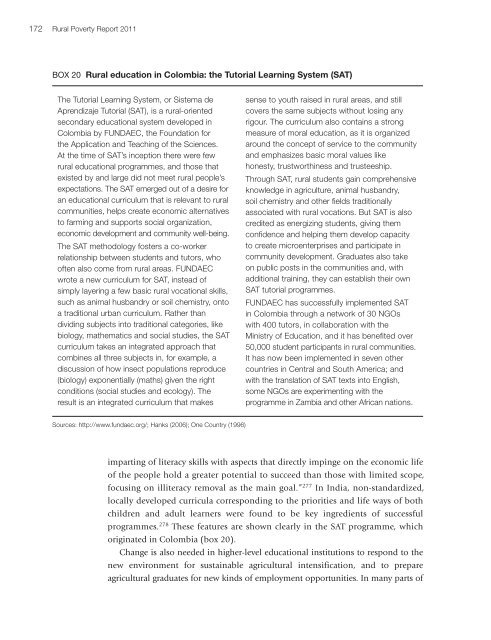English - IFAD
English - IFAD
English - IFAD
Create successful ePaper yourself
Turn your PDF publications into a flip-book with our unique Google optimized e-Paper software.
172<br />
Rural Poverty Report 2011<br />
BOX 20 Rural education in Colombia: the Tutorial Learning System (SAT)<br />
The Tutorial Learning System, or Sistema de<br />
Aprendizaje Tutorial (SAT), is a rural-oriented<br />
secondary educational system developed in<br />
Colombia by FUNDAEC, the Foundation for<br />
the Application and Teaching of the Sciences.<br />
At the time of SAT’s inception there were few<br />
rural educational programmes, and those that<br />
existed by and large did not meet rural people’s<br />
expectations. The SAT emerged out of a desire for<br />
an educational curriculum that is relevant to rural<br />
communities, helps create economic alternatives<br />
to farming and supports social organization,<br />
economic development and community well-being.<br />
The SAT methodology fosters a co-worker<br />
relationship between students and tutors, who<br />
often also come from rural areas. FUNDAEC<br />
wrote a new curriculum for SAT, instead of<br />
simply layering a few basic rural vocational skills,<br />
such as animal husbandry or soil chemistry, onto<br />
a traditional urban curriculum. Rather than<br />
dividing subjects into traditional categories, like<br />
biology, mathematics and social studies, the SAT<br />
curriculum takes an integrated approach that<br />
combines all three subjects in, for example, a<br />
discussion of how insect populations reproduce<br />
(biology) exponentially (maths) given the right<br />
conditions (social studies and ecology). The<br />
result is an integrated curriculum that makes<br />
sense to youth raised in rural areas, and still<br />
covers the same subjects without losing any<br />
rigour. The curriculum also contains a strong<br />
measure of moral education, as it is organized<br />
around the concept of service to the community<br />
and emphasizes basic moral values like<br />
honesty, trustworthiness and trusteeship.<br />
Through SAT, rural students gain comprehensive<br />
knowledge in agriculture, animal husbandry,<br />
soil chemistry and other fields traditionally<br />
associated with rural vocations. But SAT is also<br />
credited as energizing students, giving them<br />
confidence and helping them develop capacity<br />
to create microenterprises and participate in<br />
community development. Graduates also take<br />
on public posts in the communities and, with<br />
additional training, they can establish their own<br />
SAT tutorial programmes.<br />
FUNDAEC has successfully implemented SAT<br />
in Colombia through a network of 30 NGOs<br />
with 400 tutors, in collaboration with the<br />
Ministry of Education, and it has benefited over<br />
50,000 student participants in rural communities.<br />
It has now been implemented in seven other<br />
countries in Central and South America; and<br />
with the translation of SAT texts into <strong>English</strong>,<br />
some NGOs are experimenting with the<br />
programme in Zambia and other African nations.<br />
Sources: http://www.fundaec.org/; Hanks (2006); One Country (1996)<br />
imparting of literacy skills with aspects that directly impinge on the economic life<br />
of the people hold a greater potential to succeed than those with limited scope,<br />
focusing on illiteracy removal as the main goal.” 277 In India, non-standardized,<br />
locally developed curricula corresponding to the priorities and life ways of both<br />
children and adult learners were found to be key ingredients of successful<br />
programmes. 278 These features are shown clearly in the SAT programme, which<br />
originated in Colombia (box 20).<br />
Change is also needed in higher-level educational institutions to respond to the<br />
new environment for sustainable agricultural intensification, and to prepare<br />
agricultural graduates for new kinds of employment opportunities. In many parts of

















